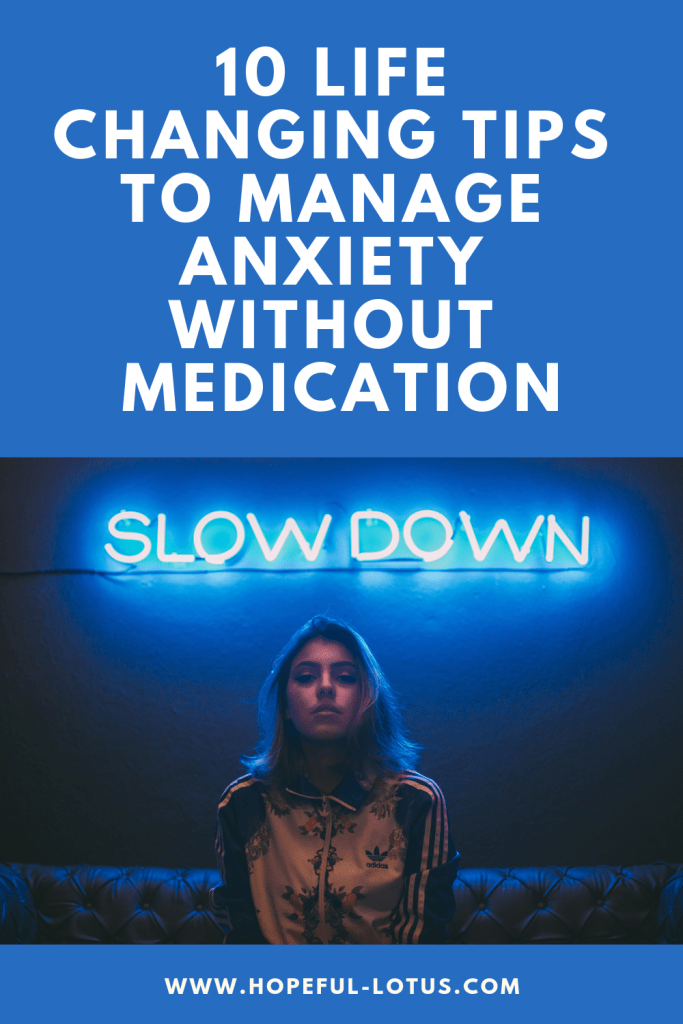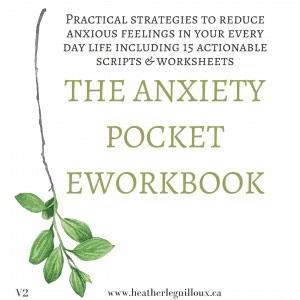I was on SSRIs for anxiety for many years, and in some cases anxiety medication may either be helpful to get you to a point where you can work through things, or essential in a mental health crisis. But medication is not essential for everyone, and many people have recovered from anxiety without medication so don’t lose hope! The following tips have been a huge part of my anxiety recovery – these are my top 10 tips for coping with anxiety without medication.

This post contains affiliate links. If you decide to make a purchase through one of these links, I will earn a small commission at no extra cost to you. I do not promote anything I do not wholeheartedly believe in or stand behind. You can click here to read my full affiliate disclosure.
How to Get Anxiety Under Control Without Medication
Meditation
Meditation has helped me so much with my anxiety symptoms and it can be such a simple tool to implement into your daily life.
Just a short period out of your day can have serious effects on your mental health and well-being. When I’ve skipped my meditation I notice such a difference in my anxiety levels.
I totally get that it can be frustrating at first if you’re not used to it, which is why I’ve created a free meditation eBook to help get you started.
Alternatively, you can check out my beginners meditation blog post so that you can get started with meditation today to kick your anxiety in the butt.
Mindfulness
Mindfulness is a technique where you bring your attention to the present moment in order to ground yourself. Mindfulness can have a dramatic reduction on anxiety levels.
What’s great about mindfulness is that it can be done anywhere at any time.
Unlike meditation, you don’t need to set aside time out of your day – just bring your attention to the present moment wherever you are.
Try adding mindfulness to everyday activities such as walking, eating or brushing your teeth.
You can also use mindfulness to help ground you during an anxiety attack or panic attack.
Breathing
When you’re anxious, you have a tendency to breathe rapid and shallow breaths through the chest. This can contribute to hyperventilation and feelings of panic.
Instead, try slowing down the breath and breathing into the stomach.
Not only is this a simple mindfulness technique, but breathing in this way actually stimulates your body’s parasympathetic response to make you feel calmer.
To reduce feelings of general anxiety, try making this your regular breathing pattern. Every time you notice you’re breathing in an unhelpful way, focus your attention on slow, deep breathing into the stomach.
After a while this will become your natural breathing pattern, thanks to the power of neuroplasticity!
Yoga
Yoga is amazing at reducing anxiety because it combines mindful movement, breathing and meditation.
Yoga has made such a significant difference in my life since I started a regular practice. If you’re not practicing yoga, check out some of the reasons why you should start a yoga practice today!
If you want to get started but are too anxious to go to a class, there are tons of good quality YouTube videos where you can learn in the comfort of your own home.
I would really recommend starting one of the 30 day yoga challenges from Yoga with Adriene, which is how I started my journey. They are beginner friendly and will help to motivate you to get on your mat on a daily basis!
Get organised
If your anxieties are tied to external stressors such as all the work you need to do but haven’t done… try implementing new techniques to get more organised.
Start a planner and give yourself small tasks to accomplish during the day/week/month.
The key here is not to set your goals TOO high. I’m all for dreaming big, but don’t set yourself up to fail, because this will only fill you with more anxiety in the long run.
Trick your mind into thinking you’ve accomplished huge things by crossing off all the tasks on your to-do-list, no matter how small.
Tidy room, tidy mind
It’s easier said than done if you struggle with low motivation like me, but tidying can have a really positive affect on your mental state.
We all know how stressful it is when you can’t find something because you have SO MUCH STUFF, or you can’t see the floor in your bedroom (maybe that’s just me)…
Getting rid of all the excess baggage can feel like a breath of fresh air, and leaves more room for things that are actually important to you.
Try taking steps to living more minimally. If this is likely to be a struggle for you, The Life Changing Magic of Tidying outlines the steps you can take to banish clutter from your home (and life) for good.
Switch off
We live in such a fast paced society where everything is go go go – it’s no wonder we feel anxious.
Feelings of anxiety and restlessness can occur when we can’t switch off because we just can’t stop thinking of all the things we could be doing.
Learn to give yourself time to just sit with yourself and do nothing. It’s okay, I promise the world will keep turning.
Switch off all your electronics and your mind will learn to switch off as a result.
Get out of the habit of scrolling through your phone last thing at night and first thing in the morning. Instead, try something more relaxing like reading a book or writing in a journal.
Your mind will thank you for it.
Self-care
We’ve spoken about the benefits of getting organised. But it’s equally as important to give yourself some TLC and time to rest.
Stop being so hard on yourself and give yourself a damn break.
Put on some relaxing music. Take a bath. Sing and dance around the kitchen while making your favourite food. These are just some ideas – I have a whole list of self care ideas for good and bad mental health days.
Don’t deny yourself the simple pleasures in life because you’re caught up worrying about other things.
And if you’re struggling with an anxiety disorder, reach out to someone. Whether it’s a family member, a mental health professional or a random person on the internet.
There is someone out there that understands and can reassure you that it will all be okay.
Change your perspective
Since exploring spirituality, my perspective on myself and the world has changed SO much.
When you’re feeling anxious about something it can genuinely feel like the end of the world. But shifting my perspective has allowed me to see just how minor my problems really are.
When your perspective changes, you become more resilient and more able to cope with anxiety.
This isn’t necessarily going to be an overnight process, but sometimes all it takes is one thought or philosophy to flip your world upside-down.
In my opinion, inspiring spiritual books are the best tool for flipping your perspective, but you can also try watching ted talks, listening to podcasts, or watching documentaries. Whatever works for you!
Try an anxiety workbook
Knowing the tools to cope with anxiety is one thing, but implementing them is another.
Sometimes when you feel overwhelmed by feelings of anxiety, motivation to implement coping skills is low and your attention may be elsewhere.
This is where workbooks come in – The Anxiety Pocket eWorkbook is a tool written by Heather Guilloux, a mental health professional, for mild to moderate levels of anxiety.
The workbook takes you through different coping skills and breaks them down into simple steps, making it easier to take control of your anxiety when it creeps in.
This easy to follow eWorkbook also contains mindfulness and meditation scripts, which are easy to follow and perfect for those high stress moments. From one anxiety sufferer to another, this could be the tool you need to overcome anxiety and stress.
Heather’s workbook is available for a small investment of $15 (about £10).
How to manage anxiety without medication recap
- Meditate – check out my free meditation eBook to get started
- Add mindfulness to everyday activities
- Change the way you breathe
- Start a yoga practice
- Get organised – set yourself small tasks!
- De-clutter and tidy your home
- Switch off from electronics
- Practice self-love
- Change your perspective – explore spiritual books and podcasts
- Follow the Anxiety Pocket eWorkbook
I truly hope this blog post has provided you with some helpful anxiety self-help tools to give you some relief from anxiety without medication.
I’d love to hear from you if you’ve tried any of these techniques – comment and let me know your experiences and please share with others who may benefit from these tools.
Take care,
Esther x

